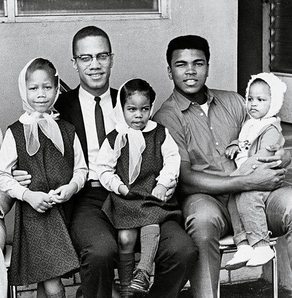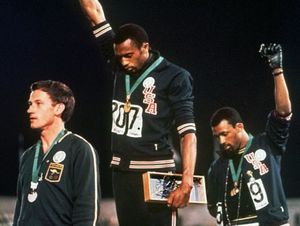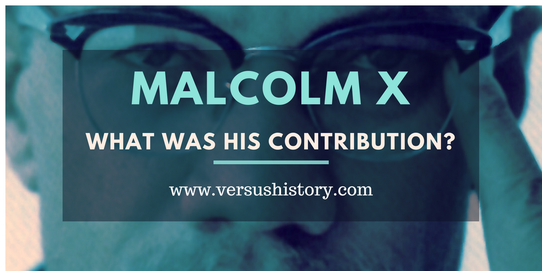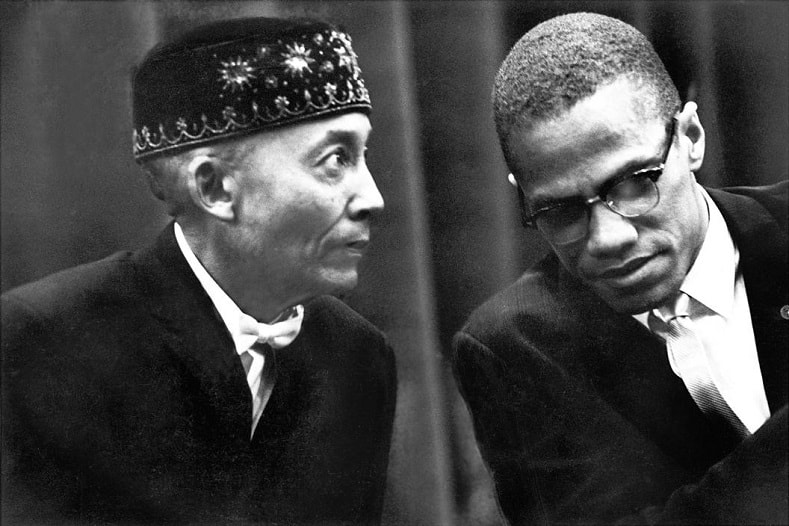 Malcolm X with Boxer Muhammad Ali. Malcolm X with Boxer Muhammad Ali. Malcolm X was one of the most enigmatic characters of the twentieth century. For most of his public life, he was a committed member of the Nation of Islam. Malcolm was born in 1925 and died in 1965, just before his 40th birthday. Between 1952 and 1964, Malcolm X was an active and prominent member of the so-called ‘Black Muslims’, serving as the National Spokesman for Elijah Muhammad’s religious and social movement. For a time, he was a close friend of boxing champion and fellow Nation of Islam member Muhammad Ali. This was a successful period for the Nation of Islam and Malcolm X. As Herbert Berg argues: “From 1955 to 1959, Elijah Muhammad sent Malcolm X to various cities to hold rallies and help establish new temples. Malcolm X helped found numerous new temples and increase membership dramatically. That is not to suggest that Malcolm X was single-handedly responsible for all these temples and converts. However, the growth of the Nation of Islam coincided with his ministry: in 1945 there were but four temples, a decade later there were fifteen, and by 1960 there were fifty” (Herbert Berg, 2009, Elijah Muhammad and Islam) By the time Malcolm X officially left the Nation of Islam in March 1964, he had less than a year to live before he was to be assassinated at the Audubon Ballroom in Manhattan on 21 February 1965. In that time, Malcolm established a secular political group, the Organisation of Afro-American Unity (OAAU), as well as a small religious group, Muslim Mosque Incorporated (MMI), while spending much of the final year of his life abroad in Africa, Europe and the Middle East. Both of the groups established by Malcolm X after his split from the Nation of Islam folded shortly after his death. In chronological terms, therefore, Malcolm spent the majority of his public life - some twelve years - promoting and advocating for the separatist religious vision of Elijah Muhammad. Given that Malcolm X spent just one year outside the Nation of Islam before his assassination and some twelve years as a leading member of that organisation, it is within the aegis and paradigm of Elijah Muhammad's Nation of Islam that we find many of Malcolm X’s more 'tangible' achievements during his lifetime, rather than the OAAU and/or the MMI.  The 'Black Power Salute in 1968, after Malcolm had been assassinated. The 'Black Power Salute in 1968, after Malcolm had been assassinated. However, Malcolm X’s energetic contribution to the Civil Rights Movement and his significant impact on the Black American community cannot be accurately gauged by the yardstick of chronology alone. Moreover, Malcolm X's role was not solely limited to popularising the Nation of Islam’s religious creed. Malcolm’s wider intellectual contribution to the black diaspora and the Civil Rights Movement was seismic. The author of Malcolm’s most celebrated biography, Manning Marable, has claimed; “He keenly felt, and expressed, the varied emotions and frustrations of the black poor and working class. His constant message was black pride, self-respect and an awareness of one’s heritage. At a time when American society stigmatised or excluded people of African descent, Malcolm’s militant advocacy was stunning. He gave millions of younger African Americans newfound confidence. These expressions were the foundation of what in 1966 became Black Power, and Malcolm was its fountainhead.” (Manning Marable, 2011, Malcolm X; A Life of Reinvention) Intriguingly, Malcolm X was dead before the Black Panthers were established. He was dead before the Voting Rights Act of 1965 came into effect. He was also dead before the famous ‘Black Power’ salute at the 1968 Olympic Games took place. However, the legacy and influence of Malcolm X outlived Malcolm X himself, perhaps gaining a posthumous momentum and allure. Much of Malcolm’s philosophy, worldview and influence permeated the many movements, groups and individuals that followed him in the quest for black equality. While Malcolm X himself did not create the ‘Black Power’ phrase and was not alive to witness it become part of the lingua-franca of the Black American community, his role as an architect of the 'Black Power' movement cannot be denied. More recently, Malcolm X's legacy has inspired countless artists, individuals and movements which is a testament to his enduring impact. Musicians from across the world such as Beenie Man, KRS One, Durrty Goodz, Jeezy and Public Enemy have mentioned Malcolm X in their music. In the 1990's, 'Malcolm X' the movie was a 'Spike Lee' epic and the autobiography by Alex Haley continues to flourish in both print and electronic formats. Today, there is a 'Malcolm X' Boulevard and a market bearing his name in Harlem, New York. The message is therefore loud and clear; Malcolm X continues to inspire and influence people long after his life was abruptly terminated, proving that the chronology of his life alone cannot contain him. Thanks for reading - feel free to get in touch to discuss! Patrick O'Shaughnessy (@historychappy) Co-Editor Versus History
1 Comment
19/11/2020 17:50:45
Undoubtedly these are great leaders, their goal was the rights and equality of blacks.
Reply
Leave a Reply. |
Categories
All
Archives
April 2024
|


 RSS Feed
RSS Feed